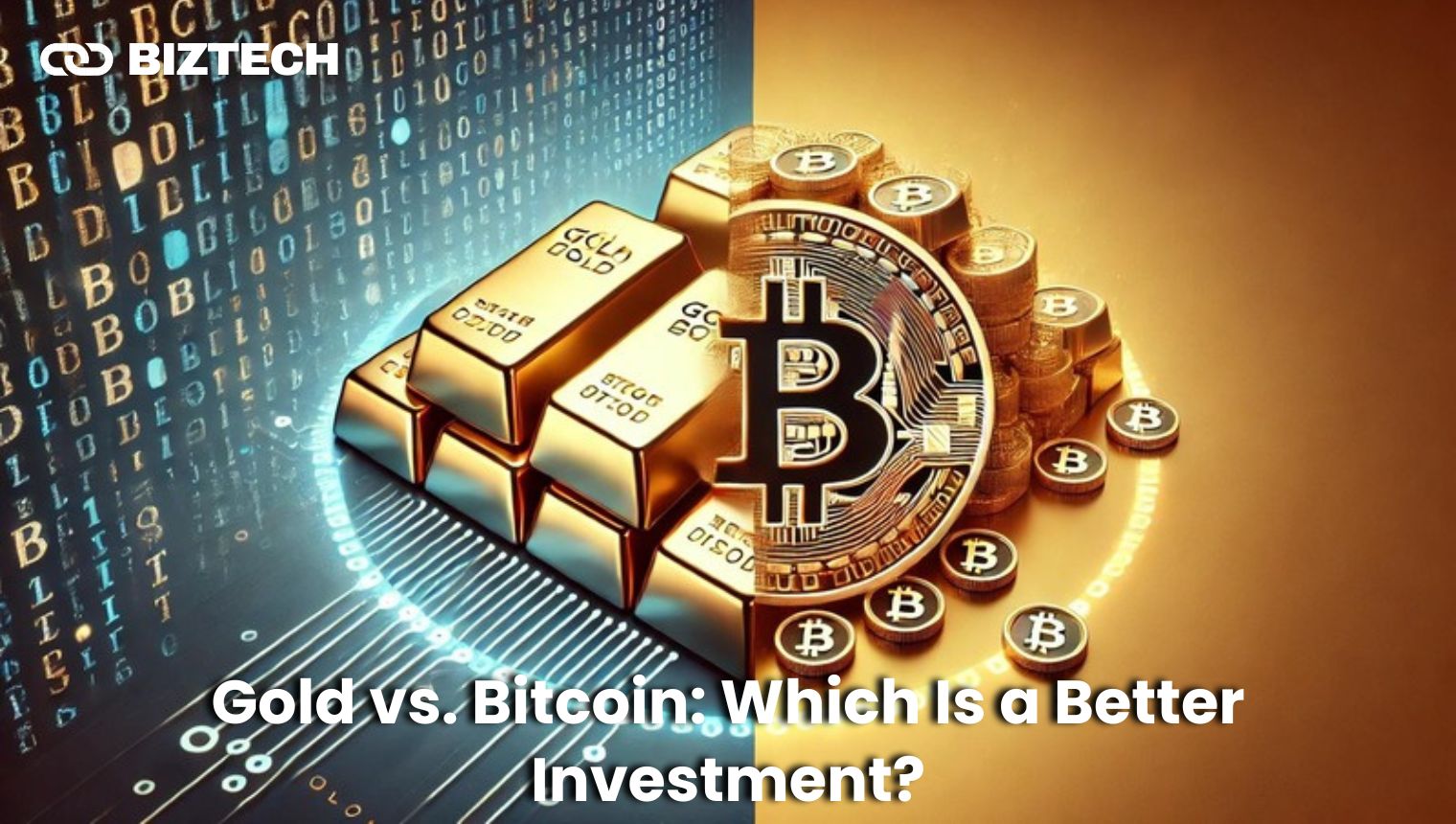There is currently a never-ending debate about Gold vs Bitcoin. Gold has been the ultimate store of value for a long time because of its scarcity and value, but Bitcoin has been disrupted because of its decentralized and digital nature.
- Overview of Gold Vs Bitcoin
- Bitcoin
- Gold
- Bitcoin Vs Gold: Comparison of Properties
- 1. Scarcity
- 2. Divisibility & Fungibility
- 3. Durability and Portability
- Gold Vs Bitcoin: Store of Value
- Bitcoin as a Store of Value
- Gold as a Store of Value
- Security and Risks Involved with Bitcoin and Gold
- Bitcoin Security & Risk Features
- Gold Security & Risk Features
- Regulation & Adoption of Bitcoin and Gold
- Bitcoin Regulation & Adoption
- Gold Regulation & Adoption
- Comparative Analysis
- Conclusion
Investors are considering where to store their money, and the decision is mainly between Bitcoin and Gold. Understanding the difference between the two is very important before allocating money to either.
This article will explain everything you need to know about Gold and Bitcoin and their role in contemporary finance. We will also explore each asset class’s strengths, weaknesses, and trajectory.
Overview of Gold Vs Bitcoin
Bitcoin
Most people call Bitcoin digital Gold. It is a decentralized digital currency that operates without control from any individual or organization. Although it was introduced in 2009 by an unknown person or group of persons, Satoshi Nakamoto is widely known as its founder.
Bitcoin transactions are recorded on a public ledger known as blockchain, making it transparent and immutable. Bitcoin uses cryptographic methods to keep transactions safe and control the creation of new Bitcoins. Bitcoin is a scarce and deflationary token, with a total supply of 21 million coins. At the time of writing,19.6 million BTC has been created from the blockchain.
One of its core features is decentralization; even governments worldwide can’t control it. The Bitcoin blockchain is controlled by a decentralized network of nodes worldwide. They validate and verify transactions, and as a reward, they receive new Bitcoins.
Since its creation in 2009, cryptocurrency has gradually gained momentum and acceptance. Many accept it as a medium of exchange, and it is even touted to revolutionize the financial space and challenge traditional banking institutions.
The Value of BTC is determined by market demand and supply, making it highly volatile. Many criticisms and regulatory problems surround Bitcoin. Still, this hasn’t stopped the digital asset from thriving and reshaping the perception of money and value in the digital age.
There are Bitcoin Spot ETFs that the Securities and Exchange Commission has officially approved.
Gold
Gold has been available throughout human history and is a symbol of wealth, beauty, and power. It is a precious and rare metal with various unique properties that make it practically and symbolically valuable.
Gold has been used as currency for thousands of years. It is a scarce metal, and its durability is another major reason why it has held value over the years. Gold can also be shaped into different beautiful forms.
The value of gold is tied to its historical and cultural significance alongside its physical attributes. Gold has always been a hedge against inflation, currency devaluation, and geopolitical uncertainty. Investors always allocate a portion of their wealth to Gold as a way of diversification and wealth preservation.
Beyond financial use cases, Gold is used in various industries, From Dentistry to aerospace and cars. It also holds religious and cultural significance in many parts of the world. Its price is affected by economic factors, central bank policies, investor sentiments, and political sentiments. The Gold market is highly liquid, with global trading going on around the clock.
Despite new asset classes, gold has maintained its place as a value store that embodies the allure of wealth and prosperity across generations.
Bitcoin Vs Gold: Comparison of Properties
Bitcoin and Gold are different, but they share some values that make them similar. Let’s check out these properties and share some insights about them.
1. Scarcity
Bitcoin’s Scarcity is tied to the algorithm, and there will only be 21 million Bitcoins. The Bitcoin halving also reduces the reward for creating a new Bitcoin every 4 years, adding to the scarcity. Gold, on the other hand, has to do with geological factors. The mining process is slow even though new gold deposits are discovered daily. Gold Deposits are not fixed like Bitcoin; new technology might make mining even faster.
2. Divisibility & Fungibility
Bitcoin can be divided into smaller units, and the smallest units are known as satoshi. The small units can also be used for transactions, driving adoption. Gold is fungible, and using some processes, it can be cut into smaller units. It might affect the value and fungibility when cut into smaller units.
3. Durability and Portability
Bitcoin is not physical, and its durability concerns the blockchain. It is portable because it can be stored and transferred electronically without third-party limitations.
Gold is durable because the metal is resistant to degradation and corrosion. Its portability is affected by weight and volume. Large quantities of Gold are challenging to move from one place to another.
Gold Vs Bitcoin: Store of Value
BTC and Gold are seen as stores of value that retain a high purchasing power over time and serve as hedges against inflation and economic instability. Let’s understand both assets in this context.
Bitcoin as a Store of Value
The scarcity of Bitcoin is one reason it is a store of value. It has a fixed supply of 21 million and is designed to be deflationary, which means its value will increase as demand grows and supply is limited.
Due to the blockchain, Bitcoin is decentralized and not subject to manipulation by governments or individuals. This has built trust and resilience over time. Bitcoin is a volatile asset, a major concern for investors. It is prone to price fluctuations driven by market sentiments, regulatory developments, and technological advancements.
Gold as a Store of Value
On the other hand, gold has a long history dating back thousands of years. Its universal acceptance, durability, and scarcity have made it a hedge against inflation and economic turmoil.
Gold has intrinsic value due to its physical properties and cultural significance. Unlike fiat currency, Gold’s value is not tied to the government. The price of gold is mostly stable, which is why it appeals to investors as a store of value. Prices fluctuate occasionally, but gold has always maintained its purchasing power.
Read also: What Are the Safest Ways to Store Bitcoin?
Security and Risks Involved with Bitcoin and Gold
Bitcoin and Gold have different security features and risks for investors. Understanding these risks and securities will help investors make informed asset allocation and portfolio management decisions.
Bitcoin Security & Risk Features
Blockchain, Cryptography, and Decentralization are the three major features that keep Bitcoin safe. Transactions are recorded on a public ledger maintained by a network of nodes. The public ledger makes Bitcoin transparent, immutable, and untampered with.
Transactions are secured using cryptographic techniques. Each transaction is linked to the preceding one, which mitigates the risks of fraud or double spending and ensures the integrity and authenticity of transactions.
Bitcoin doesn’t have a single point of control, which has helped its resilience against government interference, hacking, and censorship. Governments worldwide have been trying to stop Bitcoin for years, but it’s impossible.
The most significant risk associated with investing in Bitcoin is price volatility, which can lead to gains and losses for investors. Regulatory concerns also pose risks to Bitcoin adoption. Governments worldwide continue to create new regulations and oversight.
As technology evolves, there might be constant attempts to hack a blockchain, even though it is almost impossible. Software bugs and network disruptions can also be problems for Bitcoin.
Gold Security & Risk Features
Gold has a physical presence, which gives it more security than Bitcoin. However, it also has a problem, which we will discuss briefly.
You can hold gold and put it somewhere safe and easily accessible. Gold has historical and intrinsic value because it has existed for thousands of years and is still scarce.
Storage and transportation are among Gold’s biggest problems. Safeguarding and transporting large quantities of Gold can be challenging.
The Gold market is susceptible to manipulation, including fraudulent schemes, insider trading, and price rigging. Investors seeking gold-backed securities or derivatives may be exposed to counterparty risk associated with financial intermediaries or counterparties.
Regulation & Adoption of Bitcoin and Gold
Gold and Bitcoin have different frameworks and degrees of adoption and mainstream acceptance. Understanding regulation and acceptance will help you understand each asset’s long-term viability and stability.
Bitcoin Regulation & Adoption
The regulatory status of Bitcoin varies across jurisdictions, with some countries embracing it as a legitimate asset class and others imposing bans on BTC. Concerns include money laundering, terror financing, tax evasion, and consumer protection.
Over the last few years, there has been increased institutional adoption, with hedge funds, corporations, and asset managers incorporating Bitcoin into investment strategies. Institutional Products like Bitcoin ETFs, custody solutions, and Bitcoin Futures have emerged to cater to institutional demands.
Mainstream acceptance remains a work in progress, even as Bitcoin has gained acceptance from tech-savvy individuals and investors. Factors like volatility, regulatory uncertainty, and usability limitations have affected widespread adoption for everyday transactions.
Gold Regulation & Adoption
Gold is subject to regulatory policies in the form of mining, trading, and investment products such as ETFs and derivatives. The regulatory framework varies by jurisdiction, but it is focused on ensuring market integrity and consumer protection, anti-money laundering, and know-your-customer (KYC) regulations.
Gold has a long-standing history of institutional adoption, with central banks, sovereign wealth funds, and institutional investors holding significant gold reserves as part of their portfolios. Gold-backed ETFs have been popular in recent years, allowing investors to own gold in their portfolio without the logistical challenges of physical ownership.
Gold is accepted everywhere as a store of value and medium of exchange. Its timeless appeal transcends cultural, geographical, and generational boundaries. Gold bars, jewellery, and coins are recognized and accepted as valuable assets worldwide.
Comparative Analysis
- While Gold and Bitcoin face regulatory scrutiny and adoption challenges, both assets have different characteristics and value propositions that appeal to different investor demographics.
- Bitcoins’ disruptive potential and technological innovation have gained attention from forward-thinking investors and institutions seeking exposure to digital assets and blockchain technology.
- Gold’s enduring allure, intrinsic value, and historical track record make it a trusted and widely accepted store of wealth among conservative investors and institutional allocators.
Conclusion
Bitcoin and Gold offer different perspectives on storing value. Bitcoin’s digital nature provides divisibility and accessibility, while gold’s tangibility offers stability and historical resilience.
Despite regulatory challenges, both assets play a significant role in investment portfolios, serving as a hedge against inflation and diversification tools.
The future outlook for both asset classes depends on regulatory developments and investor sentiments. Researching and knowing how to manage risk while navigating the ever-evolving financial landscape is essential.
Whether you choose digital innovation or traditional allure, Bitcoin and Gold embody the timeless pursuit of wealth preservation in an uncertain world.






